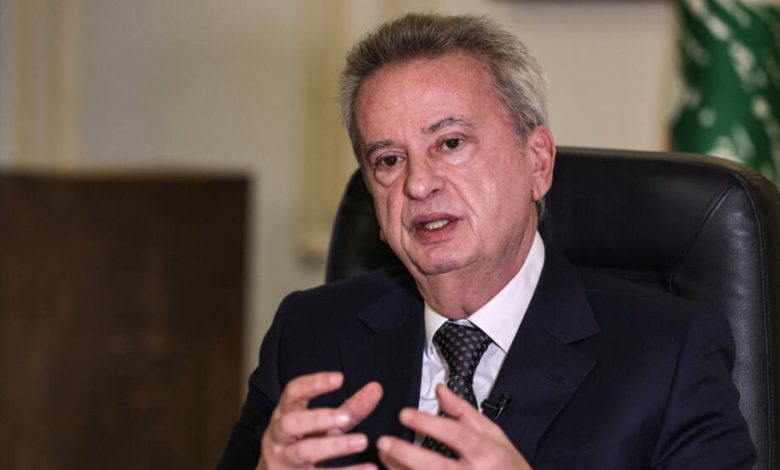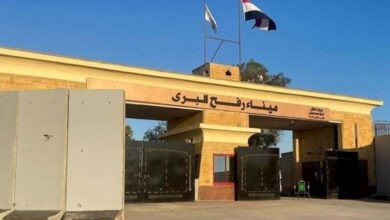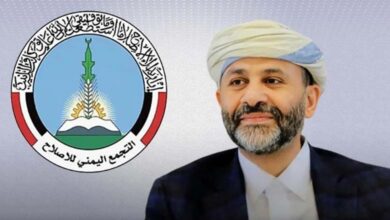Washington, Canada, and Britain Impose Sanctions on Riad Salameh

The American move to impose sanctions on the former governor of the Lebanese Central Bank, Riad Salameh, for financial corruption seems very late, as it comes after his term has ended, raising more questions about the reason for the delay when Salameh was in office.
The US Department of the Treasury announced on Thursday that the United States, Canada, and Britain have jointly imposed economic sanctions on the former governor of the Lebanese Central Bank, Riad Salameh, on charges of financial corruption. Salameh recently left his position without a successor being appointed.
This is the first time that Washington has openly entered into the issue of the former governor of the Lebanese Central Bank, as no sanctions were imposed against him while he was in office, amidst ongoing local and international investigations against him.
The American stance has raised more than one question, and it is not clear whether Washington waited until the end of Salameh’s term to impose coordinated sanctions on him and his partners, in coordination with Canada and the United Kingdom.
Explanations suggest that the United States had other calculations related to the services provided by Salameh to the American administration, including the implementation of sanctions imposed on Hezbollah leaders.
The surprise about Washington’s delay in imposing sanctions on Riad Salameh is that it had previously imposed sanctions on Lebanese politicians, including former Foreign Minister Gebran Bassil, the leader of the Free Patriotic Movement, and officials and others affiliated with Hezbollah, accusing them of facilitating financial transactions for Hezbollah or obtaining deals and projects for the benefit of the Lebanese state to enhance its financial position, similar to the Iranian Revolutionary Guard, which built a huge economic empire by implementing projects for the benefit of the Iranian state.
The US Department of the Treasury said in a statement that “Salameh’s corrupt and illegal activities contributed to the collapse of the rule of law in Lebanon.” The Treasury imposed these sanctions in coordination with both Britain and Canada.
Salameh, 73, who held the position of Central Bank governor for 30 years, is being pursued in Europe and Lebanon on charges of embezzlement, at a time when the country is experiencing its worst economic crisis in modern history.
The US Treasury Department confirmed in its statement that Salameh “abused his position of authority, most likely in violation of Lebanese law, to enrich himself and his partners by diverting hundreds of millions of dollars through fictitious companies to invest in the European real estate sector.”
The sanctions included the freezing of all assets owned by these five individuals in the United States, as well as prohibiting all US companies and citizens from conducting any business transactions with them.
The British sanctions included only four names: Riad and Raja Salameh, Marianne Howayek, and Anna Kozakova. The Canadian sanctions included only three names: Riad and Raja Salameh, and Marianne Howayek.
The Canadian Foreign Minister, Melanie Joly, said that the sanctions send a clear message that allies “will not tolerate extensive corruption activities that contributed to Lebanon’s economic collapse.”
The US Treasury Department in its statement made sure to clarify that the sanctions do not affect the Lebanese Central Bank in any way.
London, on its part, stated that this is the first time it has used the global sanctions system to combat corruption against individuals in Lebanon. The United Kingdom adopted this system in 2021 to better align its measures with both Washington and Ottawa.
The UK Foreign Office said in a statement that the quartet subject to British sanctions had their assets frozen in the United Kingdom and were also banned from traveling there. They pointed out that these four individuals participated in “diverting more than $300 million from the funds of the Central Bank of Lebanon for their private interests.”
Salameh, who held his position since 1993 until the end of last July, is considered one of the longest-serving central bank governors in the world.
He was the architect of the financial policy that allowed Lebanon to recover after a 15-year civil war (1975-1990).
However, since Lebanon plunged into an unprecedented economic crisis at the end of 2019, many hold both Salameh and the political leaders closely associated with him responsible for Lebanon’s devastation.
Salameh is currently the subject of ongoing legal investigations in Lebanon and Europe, suspected of being involved in embezzlement, money laundering, fraud, and illicit enrichment, charges he denies both in general and in detail.
In addition to his Lebanese nationality, he also holds French nationality and arrest warrants have been issued against him by both France and Germany. As a result, Interpol issued a red notice against him, but Lebanon does not extradite its citizens to other countries.
The French judiciary has issued orders to seize real estate and banking assets owned by Salameh, with an estimated total value of tens of millions of euros. In 2022, France, Germany, and Luxembourg froze assets valued at €120 million suspected to belong to Salameh. A European diplomatic source said that Salameh’s trial in Paris will begin soon.
On the other hand, Salameh, who has received regional and international awards and honors for his efforts in his position, and was the first Arab central bank governor to ring the opening bell of the New York Stock Exchange, confirms that he accumulated his wealth from his previous work during two decades at the global financial institution “Merrill Lynch” and from investments in various fields away from his position as the head of the central bank of Lebanon.
Parallel to the European investigations, the Lebanese judiciary is conducting a local investigation into Salameh’s wealth. Two weeks ago, a precautionary seizure was imposed on his properties.
In conjunction with these Western sanctions, the Lebanese judiciary suspended on Thursday the ongoing investigation for the past two years into the source of Salameh’s wealth, due to a lawsuit filed against the judge responsible for the investigation, accusing him of not arresting the former central bank governor until today.
A judicial source said that Judge Helana Iskandar, who primarily represents the Lebanese state and previously filed a lawsuit against Salameh on behalf of the state, filed a lawsuit against Judge Charbel Abou Samra for his decision to leave Salameh out of the investigation and not arrest him. According to the source, this could mean suspending the investigation for months or even years.
As a result, Abou Samra postponed interrogation sessions he had scheduled for both Howayek and Raja Salameh. A source close to Abou Samra considered what happened incomprehensible, saying, “It is the first time in the history of the Lebanese judiciary where the state sues the state, and what has happened has no explanation.”












